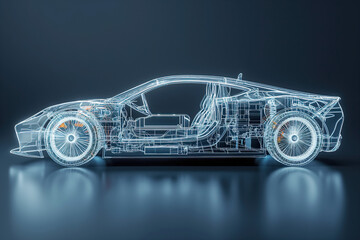Modern cars are no longer just modes of transportation they’ve become high-tech devices on wheels. The integration of smart features like autonomous driving, advanced infotainment systems, and vehicle-to-vehicle communication is revolutionizing the driving experience. With the rise of connectivity, drivers can now interact with their cars in ways that were once unimaginable. From controlling the temperature to navigating traffic with real-time updates, these smart features enhance convenience, safety, and overall driving enjoyment. This technological evolution is setting the stage for a new era of automotive design and functionality.
Autonomous Vehicles: The Future of Transportation
One of the most exciting developments in automotive technology is the advent of autonomous vehicles, or self-driving cars. These vehicles use a combination of sensors, cameras, and AI algorithms to navigate roads and make decisions without human intervention. The promise of autonomous vehicles includes reduced accidents, less traffic congestion, and the potential for more efficient use of roadways. While the technology is still being refined, several companies, including Tesla and Waymo, are making significant strides in bringing autonomous driving to the mainstream. The widespread adoption of autonomous vehicles could dramatically change the landscape of urban mobility.
Electric Powertrains and Their Role in the Automotive Revolution
Electric powertrains are at the heart of the automotive revolution, shifting away from traditional gasoline and diesel engines. These powertrains are cleaner, more efficient, and offer better performance. Electric cars are known for their instant torque, smooth acceleration, and quiet operation, making them a popular choice for consumers seeking a more enjoyable driving experience. In addition, electric powertrains require less maintenance than traditional engines, as they have fewer moving parts. As the global push for sustainability continues, the adoption of electric powertrains will only increase, contributing to a cleaner, more energy-efficient future for the automotive industry.
Connectivity and Data-Driven Vehicles
Cars are becoming increasingly connected to the internet and other devices, allowing for more personalized and data-driven experiences. Through telematics, automakers can track vehicle performance, diagnose problems remotely, and even send over-the-air software updates to improve vehicle functionality. Connectivity also allows drivers to access a wide range of services, from navigation apps to music streaming and remote vehicle monitoring. This shift towards connected cars is creating a more interactive, seamless relationship between drivers and their vehicles, and it is expected to continue evolving as technology advances.
The Role of Safety Features in Modern Vehicles
Modern cars are equipped with a variety of safety features designed to protect both drivers and passengers. Advanced driver assistance systems (ADAS), including lane-keeping assist, adaptive cruise control, and automatic emergency braking, are becoming standard in many vehicles. These technologies work together to reduce the risk of accidents and improve overall road safety. Furthermore, vehicles are now being designed with stronger frames and more advanced airbags to protect passengers in the event of a collision. As safety technologies continue to improve, driving becomes safer, and the overall road accident rate decreases.
The Influence of Artificial Intelligence on Automotive Design
Artificial intelligence (AI) is playing a critical role in shaping the future of automotive design. From optimizing manufacturing processes to developing self-driving algorithms, AI is helping automakers improve the efficiency, safety, and performance of their vehicles. For example, AI is being used to enhance in-car experiences, such as voice recognition and personalized settings, allowing drivers to interact with their cars in new and innovative ways. As AI continues to evolve, it will continue to drive innovations in automotive design, making cars smarter, more intuitive, and more responsive to the needs of their drivers.
Conclusion
The evolution of automotive technology is transforming the way we think about cars. From smart features and autonomous vehicles to electric powertrains and AI-driven design, the automotive industry is on the cusp of a technological revolution. These innovations promise to make driving safer, more efficient, and more enjoyable. As automakers continue to push the boundaries of what’s possible, the future of transportation looks brighter than ever. With continued advancements in technology, the vehicles of tomorrow will be smarter, greener, and more connected, offering a new level of convenience and safety for all drivers.
